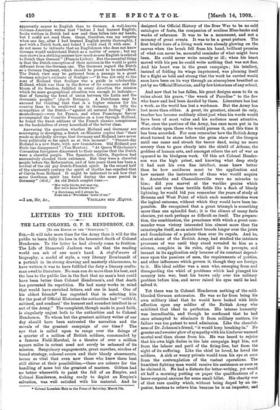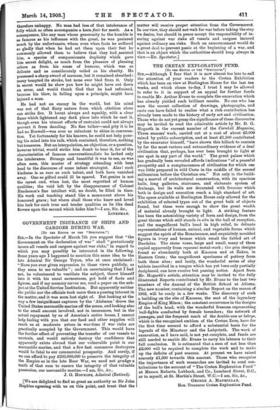LETTERS TO THE EDITOR.
THE LATE COLONEL G. F. R. HENDERSON, C.B. [To THE EDITOR Or THE " SPECTATOR...] SIE,—It will take more time for the Army than it will for the public to learn fully its loss in the lamented death of Colonel Henderson. To the latter he had already come to fruition. The Life of Stonewall Jackson was all that the reading world can ask of one man's hand. A chef-d'ceurre of biography, a model of style, a very literary Rembrandt of a portrait in its strong drawing and masterly chiaroscuro, to have written it was to have fulfilled the duty a literary crafts- man owed to literature. No man can do more than his best, and the loss to the public lies in the fact that no man's best could have been better than Colonel Henderson's, and that death has prevented its repetition. He had many works in mind that would have enriched letters, and one in hand. One of his oldest friends* has regretted that in selecting him for the post of Official Historian the authorities had " cribb'd, cabined, and confined' the keenest and soundest intellect in or out of the Army." The complaint, though made in good faith, is singularly unjust both to the authorities and to Colonel Henderson. To whom but the greatest military writer of our day should have been entrusted the narration and the morals of the greatest campaign of our time ? The eye that is called upon to range over the doings of a quarter of a million of British soldiers, commanded by a famous Field-Marshal, in a theatre of over a million square miles in extent need not surely be ashamed of its mission. Sanguinary engagements, great marches, strokes of broad strategy, colossal errors and their bloody atonements, issues so vital that even now those who knew them best still shiver at their possibilities,—these are colours for the handling of none but the greatest of masters. Gibbon had no better wherewith to paint the fall of an Empire, and Colonel Henderson, making ready to depict an Empire's salvation, was well satisfied with his material. And he • Colonel Lansdale Hale in the Times of Saturday, March 7th.
designed the Official History of the Boer War to be no cold catalogue of facts, the companion of soulless Blue-books and works of reference. It was to be a monument, and not a mummy of great events. It was to be a great picture. The first bright hues of a living work were already glowing on the canvas when the brush fell from his hand, brilliant promise of what can never be, mournful reminder of what might have been. He could never write meanly or ill ; when his heart moved with his pen he could write nothing that was not fine. And his heart was in the great campaign ; his intellect, instead of folding its wings imprisoned, was pluming itself for a flight so bold and strong that the work he carried would soon have been on its way through an atmosphere breathed as yet by no Official Historian, and by few historians of any school.
And now that he has fallen, his great designs seem to lie in ruins about his grave, "the wreck of Paradise" to the few who knew and had been dazzled by them. Literature has lost a work, as the world has lost a workman. But the Army has lost more than either, A great, its greatest, almost its only, teacher has become suddenly silent just when his words would have been of most value and his audience most attentive. War, once the pastime of the Army, has once more put in its stern claim upon those who would pursue it, and this time it has been accorded. For men remember how the British Army stood turned to stone before the grim stare of the Gorgon until one came and struck the terror dead, using no more sorcery than to gaze clearly into the shield of Athene, the goddess of human arts, and amongst others the art of war as opposed to its bludgeon work. Of this art Colonel Hender- son was the high priest, and knowing what deep study it had cost his own fine intellect, none knew better than he how assiduous must be the application and how earnest the instructors of those who would acquire it. Austerlitz and Chancellorsville were no miracles to him ; did you marvel at the warlike genius which blazed out over those terrible fields like a flash of bloody lightning, he would bid you remember the years of study at Brienne and West Point of which such master-strokes were the logical outcome, without which they would have been im- possible. He recognised that a great triumph is something more than one splendid feat ; it is the climax of many feats obscure, yet each perhaps as difficult as itself. The prepara- tion, the combination, the prescience with which a great com- mander woos victory interested him almost more than the catastrophe itself, as an architect broods longer over the joists and foundations of a palace than over its cupola. And he, almost alone of the British Army, had studied the intricate processes of war until they stood revealed to him as a science, complete in its rules, rigid in its precepts, and inexact in its application only because of its constant depend- ence upon the passions of men, the requirements of politics, and other influences which govern it, though they are foreign to it. His ideal soldier was a man who, emerging from and disregarding the whirl of problems which had plunged his country into war, bent his brows only over the military problem before him, and never raised his eyes until he had solved it.
Yet there was in Colonel Henderson nothing of the cold- blooded German automaton. He was so far from being his own military ideal that he would have looked with little affection upon any soldier of the British Army who exhibited that ideal to perfection. His intense humanity was ineradicable, and though he confessed that he had once attempted to eliminate it from military matters, his failure was too patent to need admission. Like the cheerful- ness of Dr. Johnson's friend, "it would keep breaking in." No greater and sweeter glow of sympathy with his kind ever warmed mortal soul than shone from his. He was heard to rejoice that his own high duties in the late campaign kept him, not from the labour and peril of the firing-line, but from the sight of its suffering. Like the chief he loved, he loved the soldiers. A sick or weary private would turn his eye at once from the contemplation of the vastest operations. The humblest fighting man would receive his assistance as soon as he claimed it. He had a distaste for letter-writing, yet would sit half a morning putting on paper the qualifications of a lance-corporal anxious for some small billet. His charity was of that rare quality which, without being duped by an im- postor, hastens to relieve him because he is an impostor, and
therefore unhappy. No man had less of that intolerance of folly which so often accompanies a keen flair for merit. As a consequence, like any man whose generosity to the humble is as famous as his influence with the great, he was pestered much by the unfortunate, whom even when fools he suffered so gladly that when he had set them upon their feet he commonly allowed them to believe that they had assisted him, a species of compassionate duplicity whicl gave him secret delight, as much from the pleasure of pleasing others as from his sense of humour, which was as delicate and as considerately veiled as his charity. He possessed a sharp sword of sarcasm, but it remained sheathed ; many tempted its stroke, but none ever bled from it. Only in secret would he show you how he might have cut down an error, and would thank God that he had refrained, because his blow, in falling upon a principle, might have injured a man.
He had not an enemy in the world, but his mind was not of that flinty nature from which attrition alone can strike fire. It burnt always and equably, with a clear flame which lightened any dark place into which he cast it, though even his utmost efforts of restraint could not always prevent it from dazzling. No fine talker—and pity it is be had no Boswell—was ever so reluctant to shine in conversa- tion. Yet fortunately for his hearers, he could not help pour- ing his mind into his talk, which contained, therefore, nothing but treasures. But an interpolation, an objection, or a question, however trivial, would strike him dumb to hear it, for of the characteristics of famous conversationalists he lacked only the intolerance. Strange and beautiful it was to see, as was often seen, this master of strategy attending with bent head to the discourse of some infant strategist. Alas ! such kindness is as rare as such talent, and both have vanished away. One so gifted could ill be spared. Yet genius is not the rarest and, when lost, the most regretted of human qualities; the void left by the disappearance of Colonel Henderson's fine intellect will, no doubt, be filled in time. His work and teaching stand like a monument above his honoured grave ; but where shall those who knew and loved him look for such true and tender qualities as lie like dead flowers upon the mound which hides him P—I am, Sir, &c.,
LINESMAN.











































 Previous page
Previous page